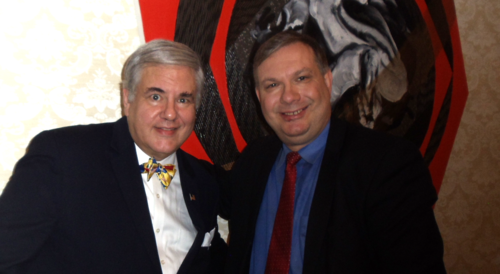Part 1: Assistant to Attorney General Meese under Reagan, compares tenure of AG Holder to Meese at Chicago Federalist Society event featuring John Fund.
As president of the Chicago Lawyers’ Chapter of the Federalist Society, founded in 1982 as a group of conservatives and libertarians interested in the current state of the legal order, Laura Kotelman welcomed those who had come to have “Lunch with Author John Fund” on Monday, September 29 at the Union League Club, 65 West Jackson, Chicago, IL. John Fund is a National Affairs columnist for National Review magazine and on-air analyst on the Fox News Channel. He is considered a notable expert on American politics and the nexus between politics and economics and legal issues. Previously Fund served as a columnist and editorial board member for The Wall Street Journal.
While John Fund was in Chicago speaking to the Chicago Lawyers’ Chapter of the Federalist Society, co-author Hans von Spakovsky was at his venue in Toledo, Ohio, doing the same to promote their book: Obama’s Enforcer: Eric Holder’s Justice Department, which catalogues the abuses of power at the Department of Justice under Attorney General Holder. Set forth is how Attorney General Eric Holder, Jr has politicized the Justice Department and put the interests of left-wing ideology and his political party ahead of the fair and partial administration of justice.
Remarks made by Federalist member Joseph A Morris, prior to his introduction of John Fund, provided a perfect segue to what Fund later shared about Eric Holder as President Obama’s Attorney General. Morris, a former Assistant Attorney General and Director of the Office of Liasion Services with the U.S. Dept of Justice under Ronald Reagan, was eminently qualified to paint an accurate profile of Edwin Meese III, who served as U.S. Attorney General under President Reagan. The comparison between Edwin Meese III under Reagan and Eric Holder under Obama in conducting the office of Attorney General was indeed worlds apart.
It was out of great respect for Joseph Morris by members of The Chicago Lawyers’ Chapter of the Federalist Society that Laura Kotelman introduced Morris as “our home town hero.” Joseph Morris is a partner with Morris & De La Rosa in Chicago.
Joseph Morris comments on Edwin Meese as Reagan’s Attorney General
Joseph Morris directed those in attendance to an Opinion piece that appeared on the morning of the Fund event (9/29) in the Wall Street Journal, “Holder’s Legacy of Racial Politics,” by Edwin Meese III and Kenneth Blackwell, former Ohio Secretary of State. The article relates how Eric Holder battled against state voter-ID laws despite all the evidence of their fairness and popularity. According to Morris, the only reason for opposing sensible voter-ID laws is a “desire for votes.”
Joe Morris, in reflecting upon Edwin Meese III, spoke of Meese as Governor Reagan’s legal advisor and head of Reagan’s campaign committee in 1980. When Reagan took office, Meese went along with Reagan as one of his three staff assistants. Howard Baker later became Chief of Staff in Reagan’s second administration. With the surfacing of the Iran Contra scandal in Reagan’s 2nd administration, Edwin Meese, having been appointed Attorney General well before the scandal broke, was assigned by President Reagan to investigate the matter. Unlike Messrs. Obama and Holder, Meese saw the job of the Attorney General as one to pursue the truth, not to cover up an internal administration scandal.
It was during Reagan’s second term with the emergence of the Iran Contra scandal that Joe Morris, serving under Reagan at the time as both Chief of Staff and General Counsel of USIA (United States Information Agency), was asked to assist the Reagan White House. Morris recalls receiving two envelopes from the White House asking that he and his entire staff at USIA assist in the Iran Contra investigation by preserving all the facts (documents, dates, etc.). The instructions to be forthcoming about preserving records and being cooperative in the Iran-Contra investigation were received not only by Joseph Morris at USIA, but were also sent by President Reagan and Attorney General Meese to every other relevant agency of the U.S. Government.
Edwin Meese, as Attorney General, told Morris that he wanted the investigation to be taken seriously. It was through Morris’ involvement in the Iran Contra Scandal, while performing his dual roles at the USIA, that he was brought into Reagan’s Justice Department as Assistant Attorney General under Edwin Meese. Because of this relationship with Edwin Meese, Morris was able to present an accurate account of the way Meese conducted himself in his role of Attorney General under Reagan. Meese, in his role as Attorney General, sat in on the meetings of the NSC (National Security Council) responsible for coordinating policy on national security issues. It didn’t take long for Meese to observe that as the only lawyer among the participants, he alone was able to advise in a way that was consistent with the Constitution.
Four principles championed by Attorney General Meese
Joseph Morris set out these four principles followed by Attorney General Meese under the Reagan administration:
- Rule of Law must always follow the truth, wherever it goes, letting the facts speak for themselves.
- The structure of the government (system of procedure) was revamped so staff members could be brought together in an open channel of communication.
- No stranger to controversy, Edwin Meese did not shrink from what he considered his responsibility. On December 4, 1986, Attorney General Edwin Meese III requested that an independent counsel be appointed to investigate Iran-Contra matters. On December 19, the three judges on the appointing panel named Lawrence Walsh, a former judge and deputy attorney general in the Eisenhower Administration, to the post.
- Fighting a battle of ideas, Meese was willing to debate the “originalist” perspective of the Constitution. In 1985, Attorney General Edwin Meese III delivered a series of speeches challenging the then-dominant view of constitutional jurisprudence and calling for judges to embrace a “jurisprudence of original intention.” There ensued a vigorous debate in the academy, as well as in the popular press, and in Congress itself over the prospect of an “originalist” interpretation of the Constitution.
John Fund speaks
In introducing John Fund, Joseph Morris spoke of Fund as being a hard worker and a close student of the Department of Justice for thirty years, with a particular interest in the soft underbelly of the election system. Morris recalled how John Fund would call him, asking to have lunch to talk about Chicago politics. John Fund would, without fail, have with him a list of well thought out questions to ask such as: “Could this Blagojewich person really become mayor?” Later on: “What about Rahm Emanuel running for mayor in Chicago with all his ties to Obama?”
The above reference made by Morris about Emanual’s mayoral candidacy became the focus of John Fund’s opening remarks. Fund related how Rahm Emanuel was one of only a few individuals who had ever apologized to him over something he had written. What prompted Emanuel’s apology was a debate with Fund at Northwestern University in Evanston, IL, at which time Emanuel called Fund names that could only be defined as over-the-top.
Expressing his delight to be back in Chicago again, while his co-author was in Toledo, Ohio, John Fund felt he had drawn the better half of the straw. There followed a pithy comment by Fund about the resignation the week before (Thursday, September 25) of Eric Holder as Attorney General due to a conflict of forces. Fund suggested that Holder’s new job title be “Permanent Witness.”
Part 2: John Fund’s knowledge and wit will be shared as he elaborates on the way Eric Holder viewed his position at Attorney General, reflected by his behavior, while serving President Obama. Additional thoughts relative to the direction of this nation will also be covered.
[Originally published at Illinois Review]





